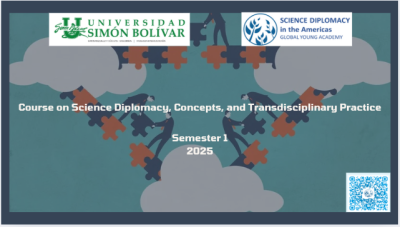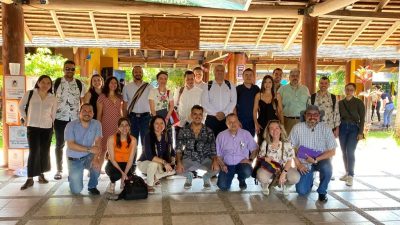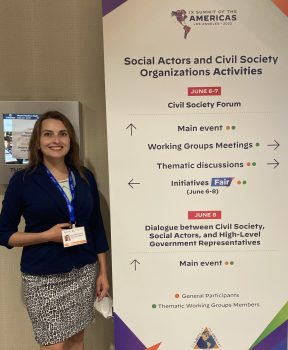
The GYA Science Diplomacy in the Americas working group started work as an Incubator in July 2021, and was promoted to GYA working group in July 2022.
It starts from the insight that in terms of scientific and economic development, America is a diverse continent. There exist many Americas, and therefore the name of this incubator (using “the Americas” in the plural) marks these differences for the need of connection between North, Central and South America, the Caribbean, Commonwealth countries, Amazonian countries, and the Southern cone.
Current science diplomacy efforts in the Americas tend to target specific regions separately (e.g., U.S. to the world, or only between Latin American and Caribbean – LAC countries) and do not primarily aim to integrate all the Americas. The lack of knowledge about the status of science in some LAC countries further aggravates the disconnection between different regions of the continent.
The COVID-19 pandemic highlighted the need for science diplomacy and the level of unpreparedness of countries to incorporate science in diplomacy. This momentum for science diplomacy should be harnessed, and openness to novel partnerships be promoted now, specially those from South to North.
This incubator activities align with UN SDG 17 – Partnerships for the goals.
Please note that there also exists a GYA working group on Science Diplomacy in South Asia, which has been active since January 2018.
The group will start by working to develop relevant partnerships in the region, and to gain an understanding of current science diplomacy initiatives in the region. Activities may result in (online) meetings and workshops, and publications on the topic, as well as a social media campaign to promote openness to partnerships between the Americas.
Ongoing projects 2024/2025:
In March 2025, the group started with a pilot course on “Science Diplomacy, concepts and transdisciplinary practice” at the Universidad Simón Bolívar in Colombia. The purpose of the course is to teach the concepts of an emerging field of professional work, with impact at a national and international level, and its application in the resolution of simple and complex problems that involve different interested parties at a national and/or international level. Through the study of real cases, role playing, literature review, study of main actors and investigative projects, the purpose is to form and strengthen critical, creative and innovative thinking skills focused on problem solving, ethical judgment and communicative competence. Training in science diplomacy, especially in the Global South, has been addressed through extracurricular training such as workshops but aimed at professionals; however, there is a need to have a course that systematizes these competencies and contextualizes their teaching in higher education institutions in the Global South. Members of the group have designed the curriculum, and it is open for universities to take and implement.

In December 2024, group co-lead Paulina Carmona and group member Alma Cristal Hernández Mondragón participated in the CILAC 2024 (Foro Abierto de Ciencias de Latinoamérica y el Caribe – CILAC) in Colombia, where they presented a session on “Co-creation of an open curriculum for teaching science diplomacy in the Americas”. Group members Luciana Balboa and Luisa Echeverría-King contributed as speakers. You can read more about CILAC 2024 and the GYA members’ contributions here.
In September 2024, the GYA’s Science Leadership Programme in Latin America and the Caribbean (LAC-SLP) – of which group members are a part – launched the Leticia Declaration, a key milestone in strengthening the connection between science, society and government in Latin America and the Caribbean. You can read more about the launch event of the Leticia Declaration here.
In September 2024, Trust in (Young) Scientists group co-lead Mohammad Hosseini represented the GYA during the Summit of the Future Action Days at United Nations headquarters, New York City, US. During the event, Mohammad participated in a panel discussion on Trust in Science and a side event on Science Diplomacy. Read a full report here.
In August 2024, group members in collaboration with the GYA Membership Selection Committee, organized an online session to share information about the GYA’s currently-open call for membership and answer any questions about the GYA and its activities, as well as queries about the application process that applicants might have. This type of session had been piloted by the GYA incubator on Science Diplomacy in Africa earlier in August.
In May 2024, as part of the GYA AGM, the group organised a Science Diplomacy Forum session that brought together GYA members, former members and local early-career researchers interested in science diplomacy to reflect on different topics with invited diplomats from different countries that have representations in Washington D.C. Ideas on how best to incorporate young scientists in science diplomacy initiatives while collaborating with embassies and assessing best strategies for collaboration and engagement were also discussed. See a brief report here.
In November 2023, the group published an 11-point “Manifesto on Intercultural Communication“. This recognises that in a young scientific community with members from all around the globe, such as the GYA, effective, cross-cultural communication is needed to navigate cultural diversity.
In August 2023, group co-lead Paulina Carmona and Mohammad Hosseini (Co-Lead of the GYA group on Trust in Science) represented the GYA as part of the International Science Council (ISC) delegation attending the High-level Political Forum (HLPF) 2023 in the United Nations headquarters in New York City. The primary goal of this event was to “address the impacts of the COVID-19 pandemic on the Sustainable Development Goals (SDGs) and explore actionable policy guidance for the full implementation of the 2030 Agenda and the SDGs at all levels.”
In June 2023, group members attended the Sustainability, Research and Innovation (SRI) Congress held in Panama. They led a training on the link between science and policy, contributed to various (hybrid) panels, and presented the Declaration of Leticia. See details here.

In late November, the group supported the National University of Colombia‘s first Latin American meeting on Science Diplomacy with logistics and co-funding. The meeting took place at the UNAL campus in Leticia, Colombia, organized mainly by group member Neil Guerrero-Gonzalez. The group co-leads Paulina Carmona-Mora and Luciana Balboa as well as members Sandra Lopez-Verges and Alma Hernandez-Mondragon represented the group in different sessions, including a session on Science Diplomacy in the Americas, GYA member Carlo Altamirano-Allende also participated in the meeting.
In September, group co-lead Paulina attended the Global Conference for Diaspora Networks in Science. She arranged a session and gave a talk on “Connecting young scientific diasporas through academies”, where she shared insights about the work of the GYA. The conference was organized by the Society for the Advancement of Science in the Arab World (SASTA). Watch the full session here.
Group member Felix Moronta gave a presentation at the GYA online event “Young and Global – A perspective on today’s challenges in science” together with other GYA members. This event was part of the Science Summit of the United Nations General Assembly (UNGA77). Read more about the session and watch the full presentation here.
 In June, group co-lead Paulina attended the IX Summit of the Americas as social actor at the Civil Society Forum & Dialogue between Civil Society, Social Actors and High-Level Government Representatives. The event, hosted by the US Government in Los Angeles is the main gathering for heads of state of the Americas. Paulina participated in the thematic discussions, including health and resilience, democratic governance, digital transformation, and clean energy among other topics, as well as in the activities fair and the Summit presidential inauguration session.
In June, group co-lead Paulina attended the IX Summit of the Americas as social actor at the Civil Society Forum & Dialogue between Civil Society, Social Actors and High-Level Government Representatives. The event, hosted by the US Government in Los Angeles is the main gathering for heads of state of the Americas. Paulina participated in the thematic discussions, including health and resilience, democratic governance, digital transformation, and clean energy among other topics, as well as in the activities fair and the Summit presidential inauguration session.
In April, group members Sandra López-Verges (Panama) and Alma Cristal Hernández Mondragón (Mexico) participated in the first course on Scientific Diplomacy in Spanish, in San José, Costa Rica. The course was organized by the University of Costa Rica in coordination with the Multicountry Office of the UNESCO in San José, the Ministry of Foreign Affairs and Worship, the Red Government Scientific Advisory Council (INGSA Latin America) and the Central American Integration System and SciDipGLOBAL, and aimed to bring together the scientific community in priority areas for the region’s sustainable development, with the diplomatic community, to transfer skills in Science Diplomacy between both spheres, and thus support the construction of a bridge between the academy and decision-makers of decision.
In 2022, the group acts as outreach partner for the Journal of Science Policy and Governance’s special issue: Innovations in Science Diplomacy: Structures, Policies & Governance for the New Decade. For this, the group supported the co-organization of a Science policy paper writing workshop on diplomacy issues with the JSPG.